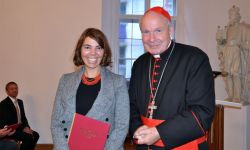
Experimental physicist Francesca Ferlaino has been awarded the Cardinal Innitzer Prize for Natural Sciences 2021 last weekend in Vienna for her outstanding achievements in the field of ultracold quantum gases. Her pioneering work with lathanoid atoms has been internationally groundbreaking in this field.
Cardinal Christoph Schönborn awarded 26 scientists with the Cardinal Innitzer Prize at the Archbishop's Palace in Vienna on Saturday. This year, due to the cancellation of last year's award ceremony caused by the pandemic, the 2020 and 2021 prizes were awarded together. Named after Vienna Archbishop Cardinal Theodor Innitzer (1875-1955), the science prize is one of the most prestigious awards of its kind in Austria. It has been awarded by the Archdiocese of Vienna since 1962 and is supported by the Federal Ministry of Science, several provinces, as well as banks, insurance companies and the Chamber of Commerce. The list of laureates reads like a "who's who" of Austrian science.
Francesca Ferlaino was awarded this year's Cardinal Innitzer Prize for Natural Sciences for her pioneering work with ultracold quantum gases. Her work with lathanoid atoms was particularly highlighted. "As a scientist, you have made a difference when others jump on the bandwagon - nowadays, more and more physicists around the world are working with precisely these atoms. It is therefore no exaggeration to say that Ferlaino has done true pioneering work," said laudator Ulrike Diebold from TU Wien.
About the laureate
Francesca Ferlaino, born in 1977, began her study in physics at the University Federico II of Naples, where she received her master in 1998. In 2004, she received her doctoral degree from the University of Florence and LENS. She joined Innsbruck in 2007 as post-doc and Lise-Meitner fellow to work in the group of Rudolf Grimm until she became appointed as Professor at the University of Innsbruck and Scientific Director at the Institute of Quantum Optics and Quantum Information (IQOQI) in 2014.